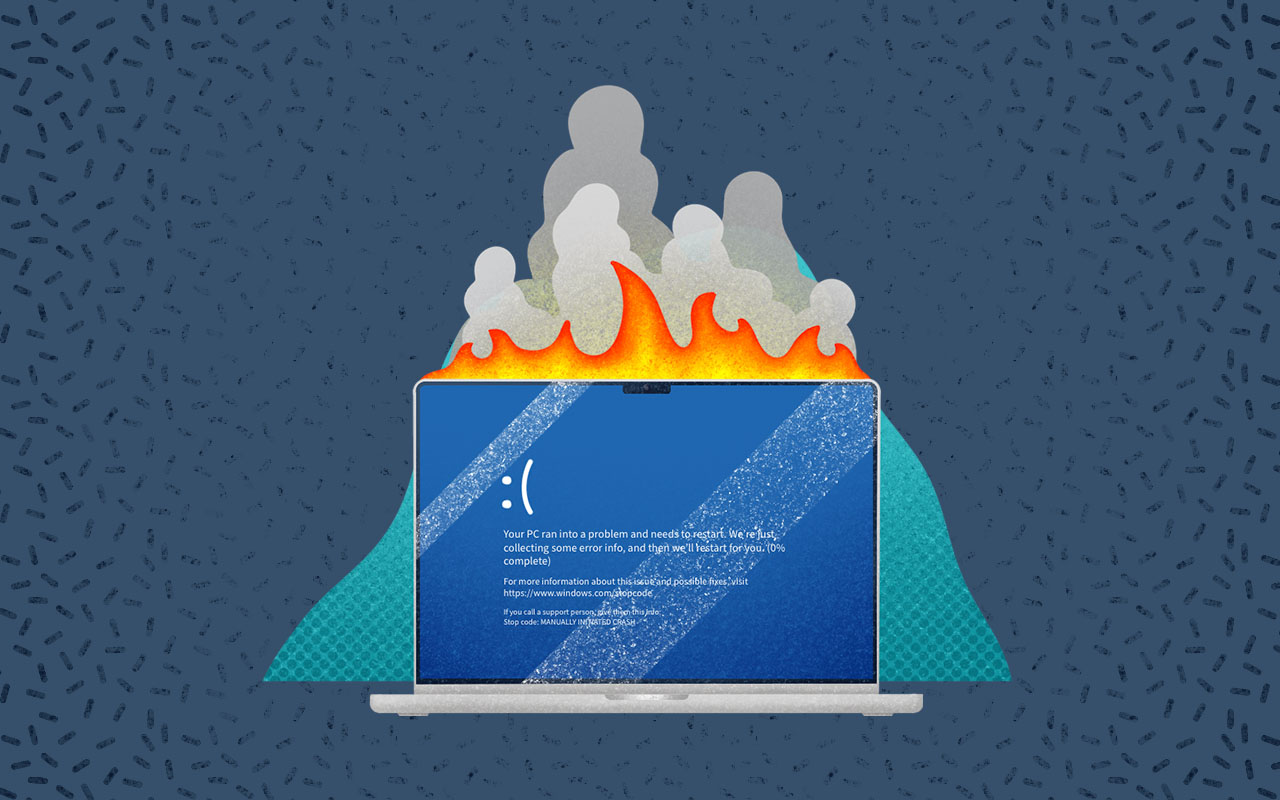INDEX
- Introduction
- Impact of the Windows IT Outage
- Importance of a Robust Remote Support Solution
- Key Features and Benefits of EV Reach
- Conclusion
- FAQs Related to the Windows IT Outage
Introduction
In today’s digital era, the stability and reliability of IT systems are critical for business operations. IT outages can severely impact productivity and financial performance.
The recent incident on July 19, 2024, involving widespread Blue Screen of Death (BSOD) errors on Windows PCs, highlights the vulnerability of modern IT infrastructures.
A security update from Microsoft, coupled with a faulty update from CrowdStrike, triggered these global system failures, affecting a wide range of businesses from airlines to banks and TV broadcasters.
Impact of the Windows IT Outage
The BSOD errors resulted in substantial operational disruptions. Airports like Melbourne experienced significant delays in check-in procedures, while major media outlets such as Sky News in the UK went offline.
The ripple effects were felt globally, causing considerable inconvenience and financial loss to numerous organizations relying on Windows systems for critical operations.
Importance of a Robust Remote Support Solution
The recent Windows outage underscores the necessity for robust remote support solutions that can swiftly address and mitigate such disruptions.
Effective remote support tools are critical for IT departments to maintain system functionality, resolve issues promptly, and ensure continuous service delivery. These tools not only facilitate immediate troubleshooting and remediation but also enhance the overall resilience of IT infrastructures by providing real-time monitoring, proactive maintenance, and comprehensive automation capabilities.
In an increasingly digital and interconnected world, having a reliable remote support solution is essential for minimizing downtime, safeguarding business continuity, and maintaining customer trust.
Key Features and Benefits of EV Reach
EV Reach is designed to offer comprehensive remote support and IT management capabilities, making it an ideal solution for handling incidents like the recent Windows outage.
The platform provides immediate remote access, allowing IT teams to troubleshoot and resolve issues swiftly, minimizing downtime. Its real-time monitoring capabilities ensure continuous oversight of system health and performance, with instant alerts enabling rapid responses to anomalies. By automating repetitive IT tasks such as patch management and software updates, EV Reach reduces the likelihood of human error and keeps systems up-to-date with the latest security patches, preventing similar incidents from recurring.
Moreover, EV Reach tracks all IT assets across the organization, offering visibility into hardware and software inventory. This facilitates proactive maintenance and upgrades, ensuring long-term system reliability.
The solution also generates detailed reports on IT performance, helping identify trends and areas for improvement, and provides actionable insights for better decision-making. By streamlining and automating complex workflows, EV Reach enhances operational efficiency, reduces manual intervention in incident responses, and ensures consistent execution of IT processes, thereby minimizing errors and improving service reliability.
These features collectively enhance service availability, optimize costs, improve IT efficiency, and facilitate proactive incident management, making EV Reach an indispensable asset for modern IT departments.
Conclusion
EV Reach by EasyVista is an essential tool for managing IT outages and ensuring service continuity. Its comprehensive features, including remote support, real-time monitoring, automation, advanced reporting, and process automation, make it an indispensable asset for modern IT departments. By adopting EV Reach, organizations can significantly enhance their IT efficiency, reduce costs, and ensure a seamless service experience for their users.
For more details on EV Reach and how it can benefit your organization, visit EV Reach End-to-End Service.
FAQs Related to the Windows IT Outage
What caused the recent Windows IT outage?
The recent Windows IT outage was caused by a faulty update from CrowdStrike, a cybersecurity provider, which led to widespread Blue Screen of Death (BSOD) errors on Windows PCs. This was compounded by a security update from Microsoft.
Which industries were most affected by the outage?
The outage affected a wide range of industries including airlines, banks, supermarkets, TV broadcasters, and other businesses that rely on Windows systems. Major disruptions were reported globally, including significant impacts at airports and media outlets.
How can organizations prevent such outages in the future?
Organizations can prevent such outages by implementing robust remote support and IT management solutions that provide real-time monitoring, automated patch management, and rapid response capabilities. These tools help in promptly identifying and resolving issues, thus minimizing downtime.
What immediate steps can be taken to resolve BSOD errors?
Immediate steps to resolve BSOD errors include booting the affected system into safe mode, identifying and deleting the problematic update file, and restarting the system. Specific instructions for resolving the recent BSOD issue involved deleting a specific CrowdStrike driver file from the system.
What are the long-term solutions to enhance IT resilience?
Long-term solutions to enhance IT resilience include adopting comprehensive IT management platforms that offer features such as real-time monitoring, automation of routine tasks, proactive maintenance, and detailed reporting. These solutions help in maintaining continuous service delivery and minimizing the impact of potential outages.

